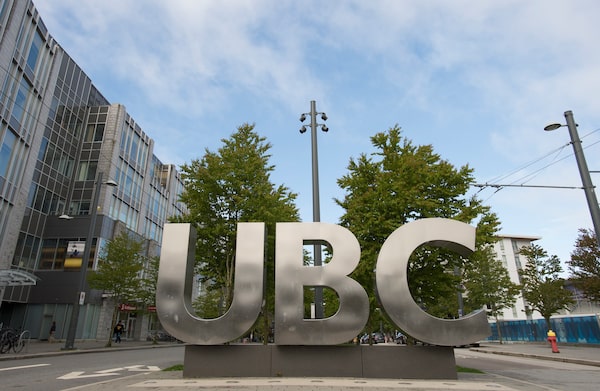
University of British Columbia president Santa Ono said the school would be ready to increase its level of on-campus activities in September.Jonathan Hayward/The Canadian Press
A growing number of Canada’s universities say they’re planning a return to in-person instruction this fall as the rollout of vaccines gathers pace and institutions turn their attention to the year ahead.
B.C. Provincial Health Officer Bonnie Henry told the presidents of colleges and universities in her province this week that they should prepare to conduct in-person instruction in September. The provincial ministry said it will issue guidelines over the next few months on how to safely resume campus life.
University of British Columbia president Santa Ono said in a campus e-mail broadcast that based on current immunization timelines, UBC would be ready to increase its level of on-campus activities in September. The provincial government has indicated that if vaccine delivery goes as planned, it should be possible for everyone in the province who is eligible to be immunized by midsummer.
McGill University in Montreal was among the first to say it was committing to resume a more regular rhythm of campus activity when it announced its plans last month. It has also said it will guarantee a place in student residence for any incoming student who wants one, an indication that it believes communal living can be safely handled.
Christopher Buddle, associate provost for teaching and academic programs at McGill, said no one has a crystal ball, but there is reason to be cautiously optimistic about delivery of vaccinations. He said it’s too early to say whether the university will require students to have some kind of proof of immunization to attend campus or sit in on lectures.
But there is genuine enthusiasm for something resembling the old buzz of campus life.
“There’s some trepidation and worry, but there’s also a real excitement. What we’re hearing is that students are missing other students, they’re missing the social connections that go along with learning. They’re missing the community and connecting with their instructors,” Dr. Buddle said.
“McGill, like most institutions across Canada, is primarily an institution built on in-person academic experiences. And we’ve heard from students that learning online is tough.”
Kayla Weiler, national executive representative for the Canadian Federation of Students in Ontario, said the organization polled students on their views about online learning late last year.
Many responded that online learning is just not working, Ms. Weiler said. Students are eager to get back to campus to take advantage of all the opportunities that the environment offers. Whether they’ve missed libraries or labs or just the opportunity to get to know their classmates, students have sacrificed over the past year and are eager to make up for lost time.
Ms. Weiler said some students may be nervous about returning if there’s uncertainty about the level of community immunization. There will also be concerns about the steps schools are taking to promote the safety of staff and students, particularly around questions such as classroom occupancy and ventilation. She said universities should be as concrete as possible about their policies so students can make informed decisions on whether to go back to campus.
“Students need to know if there’s going to be 50 people or 150 people in their class,” she said.
Other universities have indicated that they plan to increase on-campus activities in the fall, but have yet to determine the details.
The University of Toronto said this week that it is making plans for fall in a “spirit of optimism and continued vigilance,” which means most courses and co-curricular activities should resume as before if it is possible to do so safely. Queen’s University in Kingston has said small classes and labs will resume, but if physical-distancing rules remain in place, large classes will likely stay online. Some schools, such as the University of Manitoba, have not yet announced what they will do in September. The University of Alberta said it plans to welcome significantly higher numbers of students to campus and that many undergraduate courses will be conducted face to face.
Most institutions say they don’t plan to run large classes in packed lecture halls. Classes that would once have occupied the largest lecture theatres at most schools will be online.
Dr. Buddle said one take-away from the pandemic is that some lecture courses can be done quite well online, and students appreciate the convenience of being able to watch those lectures on their own schedule. He said McGill and most universities will likely continue the practice in the years ahead.
Our Morning Update and Evening Update newsletters are written by Globe editors, giving you a concise summary of the day’s most important headlines. Sign up today.